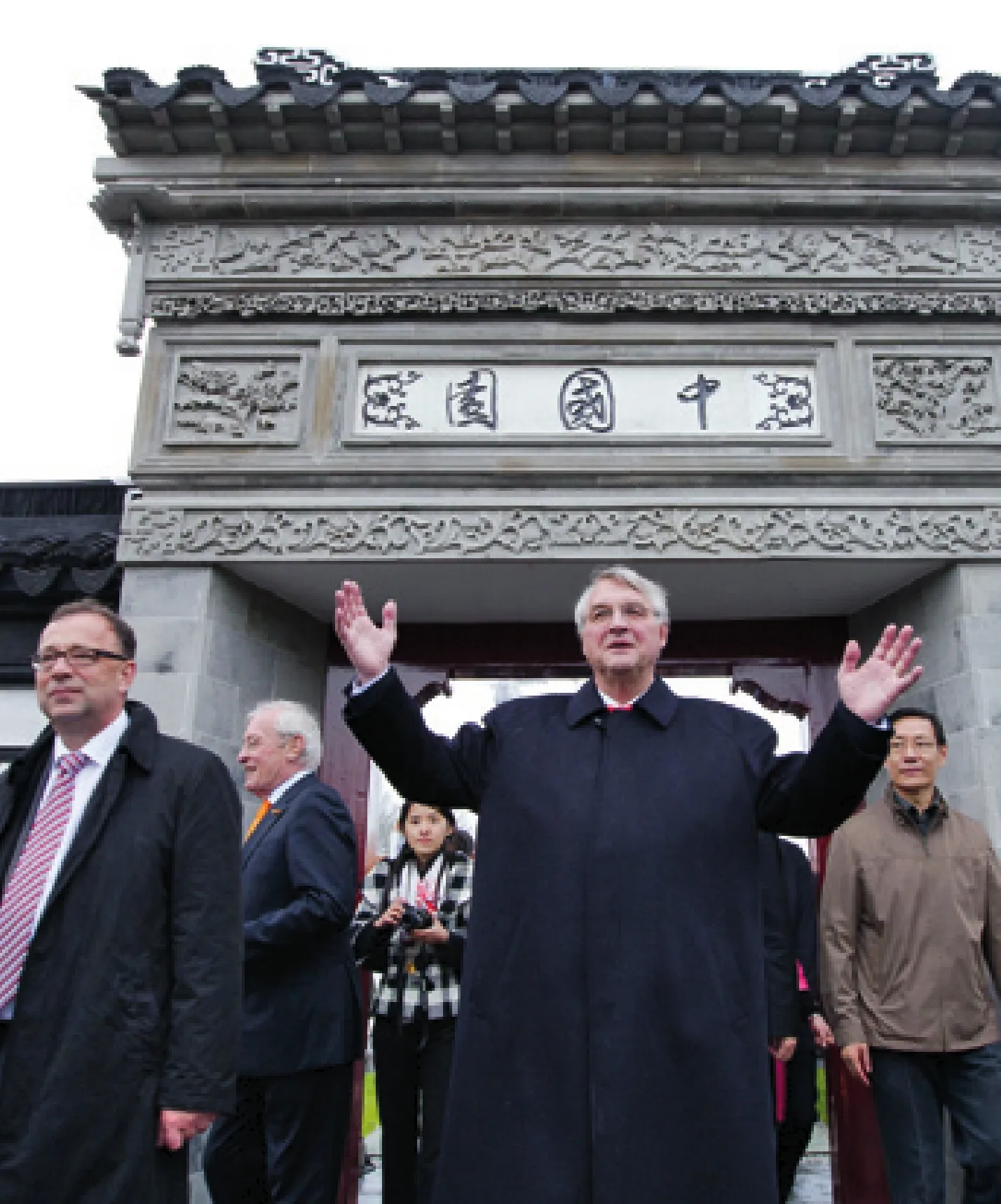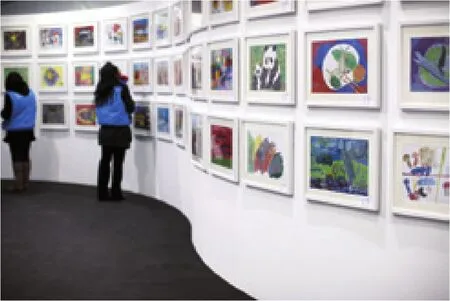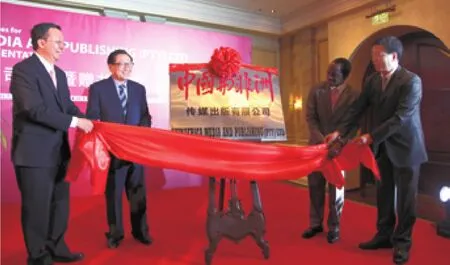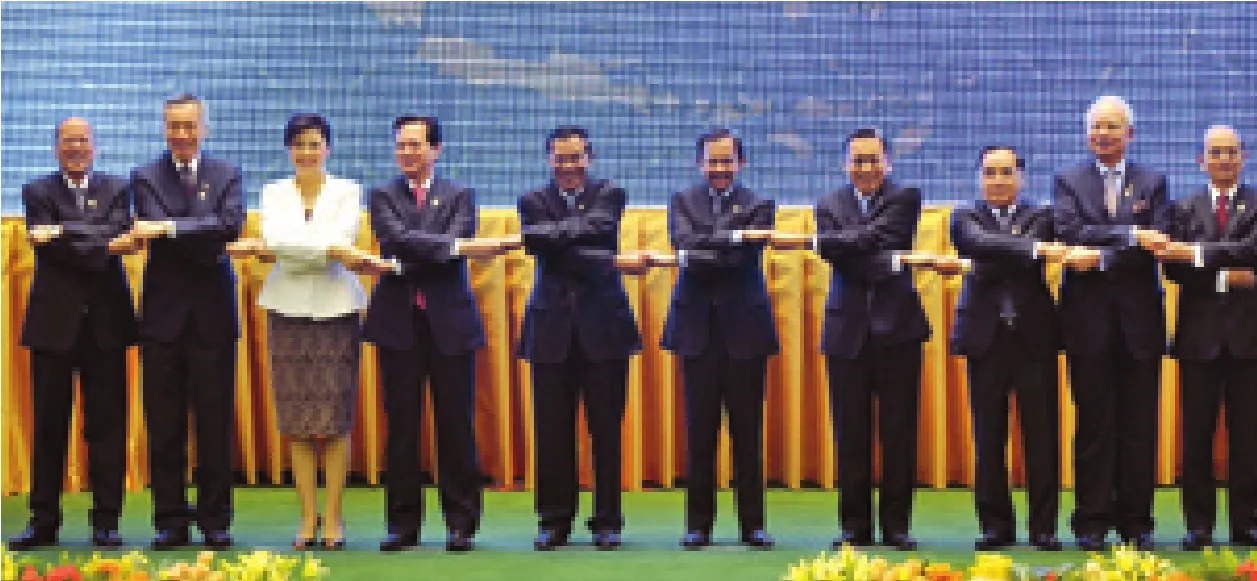THIS WEEK
THIS WEEK

XINHUA
Being Part of Nature
Paul Beck (center), Managing Director of the World Horticultural Expo, or Floriade 2012, at the opening of the Chinese Garden in Venlo, the Netherlands, on April 4. The garden was built with the Humble Administrator Garden in Suzhou, Jiangsu Province, one of China’s most famous ancient gardens, as the prototype. Covering an area of 1,500 square meters, it was the biggest theme exhibit area at the Floriade.
Opened on the same day, the Floriade 2012 will run six months,with the theme of integrating into nature and changing the quality of life. The Floriade is held every 10 years in the Netherlands. This year, the event will showcase the gardening arts of 35 countries and is expected to receive around 2 million visitors.
“China encourages capital fl ow,especially through the goingout policy. So enterprises and other businesses now have more overseas investment. There may be further deregulation to allow Chinese enterprises and residents to invest overseas more easily.”
Zhou Xiaochuan, Governor of the People’s Bank of China, saying China might further loosen its controls on overseas investment in the future to facilitate Chinese enterprises and residents to invest overseas, on the sideline of the Boao Forum for Asia on April 3
“Any hasty move about the Syrian issue creating a power vacuum in Syria could have serious detrimental consequences for the region. We are hopeful about Annan’s mission in Syria and we think the support of Turkey, Arab states and the United Nations to his mission can help settle the Syrian issue.”
Iran’s Foreign Minister Ali-Akbar Salehi, in a media interview on April 4
“Britain’s economy is still facing huge challenges and the recovery is much too slow. Britain has the potential to recover, but to achieve that the government has to set businesses free to grow.”
John Longworth, Director General of the British Chambers of Commerce, on April 3
“Exports are better than expected, suggesting the United States and EU economies are recovering.”
Cai Jin, Vice Chairman of the China Federation of Logistics and Purchasing, commenting on the continuous increase of China’s Purchasing Managers Index, which jumped to 53.1 percent in March, 2.1 percentage points higher than a month earlier

COLORFUL WORLD An exhibition of paintings created by autistic children is held in a gallery in Sanlitun,Beijing, on April 2, World Autism Awareness Day
Aid for the Disabled
About 2.12 million impoverished handicapped people were covered by various poverty relief programs in 2011, according to the China Disabled Persons’ Federation.
Last year, 87,000 handicapped individuals found employment through 4,000 poverty support centers across the country. These employment opportunities also uplifted the lives of a further 156,000 family members and dependents.
A further 71,000 disabled people in rural areas benefited from a favorable loan policy that offered reduced interests, while a pairing project enabled 328,000 individuals and 52,000 units to provide long-term financial support to impoverished handicapped persons.
Local governments throughout the country also spent 950 million yuan ($151 million)to renovate the homes of 94,000 families with disabled members.
The overall population of impoverished disabled people in China’s rural areas is estimated at about 25 million.
Highways in Tibet
Southwest China’s Tibet Autonomous Region will invest heavily in constructing rural highways to provide road transportation to remote villages, local authorities said.
A total investment of 3.11 billion yuan($494.2 million) will be made and 13,385 km of rural highways will be built in three years, according to a statement issued by the regional Department of Transportation.
The extended network will end the seclusion of 669 villages by linking them to the highway network.
Heavy investment in Tibet’s infrastructure had expanded the region’s network of highways to cover about 90 percent of villages as of 2011, but of fi cials said 714 Tibetan villages still lacked access to road transport.
Gender Ratio
Census data indicates that the gap between the number of boys and girls born in China has reduced for three consecutive years.China’s imbalanced gender ratio is a major demographic problem and Chinese families traditionally prefer male to female children.
According to the National Bureau of Statistics, China’s gender ratio stood at 117.78 newborn boys for every 100 baby girls in 2011, a decline from 119.45 in 2009 and 117.94 in 2010.
This result indicates that government measures, including crackdowns on illegal prenatal gender tests and selective abortions, are proving effective, said the National Population and Family Planning Commission.
A natural gender ratio at birth should be somewhere between 103 and 107 boys to every 100 girls.
Satellite Access
The State Oceanic Administration on March 30 gave the public access to data products from the oceanic survey satelliteHaiyang-2,which monitors the maritime environment and extreme weather.
The satellite provides services for oceanic disaster prevention and relief, resources exploitation, environmental protection, oceanic research, as well as safeguarding oceanic rights, according to the administration.
The administration said it will further expand the scope for the use of the data from the satellite, and make as much use of its capacity as possible in a bid to provide fi rst-class services to data users.
The satellite was launched in mid-August last year.
Basketball Hero
Stephon Marbury, a former NBA guard, led the Beijing Jinyu Ducks, a basketball team based in Beijing, to their first-ever championship of the Chinese Basketball Association (CBA) league on March 30. Marbury was widely praised by his teammates and the coach for his great performance this season.
Marbury lifted the team with 41 points and 7 assists in the final in which Beijing beat Guangdong Hongyuan 124-121. Beijing won the CBA championship series 4 games to 1. Beijing’s rival Guangdong has been crowned champion seven times in the past eight seasons.
“I kept my promise. When I first came to China, I promised that I would win a CBA championship. I have a different life in China, and I cherish this opportunity. I will retire in China, and I’m still playing basketball,” said Marbury.
Marbury, 35, was born in New York City and played in the NBA from 1996 to 2009, with the Minnesota Timberwolves,New Jersey Nets, Phoenix Suns, New York Knicks and Boston Celtics. He was an NBA All-Star in 2001 and 2003. In January 2010, Marbury joined the Shanxi Zhongyu Brave Dragons of the CBA. And he left the team in December 2010 to join the Foshan Dralions. He joined the Beijing Jinyu Ducks in 2011.
Chinese audiences have said Marbury should be selected as this year’s MVP, but the CBA MVP must be Chinese, according to present regulations. Besides his great career success, Marbury is also committed to charity in China.

Cross-Straits Military Trust
The Chinese mainland agreed to exchange views with Taiwan on military issues “in due time” and discuss establishing a mechanism of cross-Straits military mutual trust, a mainland of fi cial said on March 28.
Such a mechanism is aimed at “stabilizing the situation across the Taiwan Straits and alleviating security concerns,” said Yang Yi,a spokesman for the State Council Taiwan Affairs Of fi ce at a regular press conference.
“We are glad to see scholars discuss the issues,” Yang said.
Furthermore, Yang said the all issues areopen to discussion so long as both sides across the Taiwan Straits recognize that there is one China.
Grassland Restoration
Qinghai Province in northwest China has earmarked 1.95 billion yuan ($309 million)for the restoration of degraded grasslands this year, local authorities said.
The bulk of the fund will be spent on subsidizing herders who observe pastoral bans on degraded grasslands, said Zhang Huangyuan,Director of the Qinghai Department of Agriculture and Animal Husbandry.
Expanding human settlements and excessive herding have degraded Qinghai’s 3.6 million square km of grasslands, threatening the development of local agriculture and the fragile ecosystem in the headwater area of the Yangtze River, China’s largest waterway, Zhang said.
The provincial government has unveiled a plan to cull and resettle more than 6 million heads of cattle in the overgrazed area within three years.

NEW INITIATIVE Chinese Ambassador to South Africa Tian Xuejun, Vice Chairman of the Standing Committee of the National People’s Congress of China Hua Jianmin, First Minister for the Presidency of South Africa Collins Chabane and President of the China International Publishing Group Zhou Mingwei(clockwise from left) launch the ChinAfrica Media and Publishing Ltd. in Pretoria on March 30
Language Learning
More than 700 foreign language training institutions have been set up in Beijing to encourage people to learn another language,according to the Organizing Committee of Beijing Speaks Foreign Languages Program.
In addition, the government has developed lectures popularizing foreign languages and introducing other cultures to enable people to get involved in picking up another language.
To encourage citizens to get involved in foreign language learning, some 100 public lectures on foreign languages and cultures given by renowned professors will be provided in 2012, the committee said.
War Tribunal Research
China has established a center for research of the Tokyo War Crimes Tribunal (1946-48), an international military court established to try Japanese war criminals after World War II.
The National Library of China and Shanghai Jiao Tong University signed an agreement on setting up the center on March 31. The center will combine the library’s abundant archives and the university’s excellence in researching history, law and international relations.
China was the biggest victim of Japanese aggression and a key member of the World Anti-Fascist Alliance. Its judge, prosecutor,and assistants present at the tribunal made a leading contribution to listing war crimes suspects, collecting evidence and testimony and drafting judgments.

MEETING BIRDS Workers dressed as mascots for the First Shahu International Bird Watching Festival welcome birdwatchers in the Shahu Lake Scenic Area in northwest China’s Ningxia Hui Autonomous Region on March 30
CHEN DUO

CEREMONY FOR WATER A man fastens a bamboo-made rope to a tree during a ceremony to offer sacri fi ces to water at the Dujiang Dam, a 2,300-year-old irrigation project in southwest China’s Sichuan Province, on April 4
Boosting Imports
China, the world’s second largest importer,will cut import duties on some energy products, raw materials, consumer goods closely related to people’s daily lives, and key spare parts that China does not produce, said the State Council on March 30.
It is the first time the State Council has devoted a regular meeting to the issue of boosting imports, which is usually the responsibility of the Ministry of Commerce.
The decision, coming after China posted its largest monthly trade deficit in at least a decade in February, underlines the country will buy more from its trade partners to boost domestic consumption.
“As we maintain steady growth in export,we should focus more on import and appropriately expand its amount,” said the State Council.
China will also encourage importers to buy more from countries that have free trade agreements with China, such as Pakistan,New Zealand and member countries of the Association of Southeast Asian Nations.
Experts said the new move is expected to reduce China’s trade surplus by increasing imports, which may help reduce trade frictions with other countries.
Quota Expanded
China Securities Regulatory Commission(CSRC) announced on April 3 that it has expanded its Renminbi Qualified Foreign Institutional Investor (RQFII) pilot program by increasing the investment quota by 50 billion yuan ($7.94 billion) from the previous 20 billion yuan ($3.18 billion).
The RQFII mechanism, which was launched in December 2011 to widen investment channels for overseas yuan funds on the Chinese mainland, allows quali fi ed investors to invest yuan-denominated funds raised in Hong Kong in the mainland securities market within a permitted quota.
The CSRC will allow institutions under the RQFII program to issue exchange-traded funds made up of A shares and consider further expanding the scale of the pilot scheme,the range of institutions and investment proportion.

HOT SPOT Visitors swarm into Jinli Street in Chengdu,capital of southwest China’s Sichuan Province, on Tomb-Sweeping Day on April 4,an annual public holiday
The State Administration of Foreign Exchange kicked off the RQFII trial scheme in December 2011 with an initial quota of 20 billion yuan, aiming to facilitate the back fl ow of the yuan and promote the internationalization of the currency.
The CSRC has also expanded the investment quota of Quali fi ed Foreign Institutional Investor (QFII) by $50 billion.
Launched in 2002, the QFII program has so far allowed overseas investors to make investments in China’s stock markets under a preset investment quota of $30 billion. To date, China has granted 158 QFIIs from 23 countries and regions, according to the CSRC.
Openness Index
Shanghai, China’s economic hub, is the most open city in the country for its deep involvement in developing an export-oriented economy, according to a report released by the National Development and Reform Commission (NDRC) in Boao, Hainan Province, on March 31.
This is the first time China released an openness index for its 31 administrative regions on the Chinese mainland. Beijing and south China’s Guangdong Province ranked second and third, respectively, in terms of their degree of openness, which was measured using three primary indices for economic,technological and social development.
The move will help identify regional economic differences and serve as a reference for the country’s policy choices, said Wei Jianguo, Secretary General of the China Center for International Economic Exchange and former deputy minister of commerce.
Southwest China’s Guizhou Province ranked the lowest after northwestern Qinghai Province and Tibet Autonomous Region.
Cao Wenlian, Deputy Director of the NDRC’s Fiscal and Financial Department,said the ranking will help the country’s less-open regions to recognize their devel-opmental advantages and encourage them to make more efforts to match their openness ratings with their own economic development levels.
Rare Earth Association
China’s long-awaited rare earth industry association is due to be established in April and will have more than 100 members, covering the majority of companies in the industry chain, according to aChina Dailyreport.
There has been widespread market speculation for years that the government would set up an official organization to strengthen ties among the industry’s players.
The association will be supervised by the Ministry of Industry and Information Technology, according to a report fromNational Business Dailyciting anonymous sources.
The major functions of the association will include providing production guidelines,market research and channels of communication between companies and the government,said the report, adding that the association will play a role in influencing rare earth import and export quotas.
China, with its output of the strategically important minerals accounting for about 97 percent of the global total, faces pressure from the EU, the United States and Japan, which filed a joint case to the WTO against China over its alleged unfair controls on rare earth exports.
Facing possible trade disputes between China and Western countries, the association has noted one of its pressing tasks is to proactively deal with the disputes and guarantee the interests of the Chinese rare earth industry, said Yuan Zhibin, an analyst at the Shenzhen-based industry research company CIConsulting.
Other responsibilities will include strengthening communications among companies and encouraging mergers and acquisitions in the industry, he added.

NEW CONNECTION The expressway linking Guangyuan and Nanchong of southwest China’s Sichuan Province opens on April 1. The 201-km expressway halves the travel time between the two cities to two hours
Coca-Cola’s New Plan
The world’s top soft drink producer Coca-Cola will expand production in China over the next 10 years.
David G. Brooks, president of Coca-Cola’s Greater China and Korean branches,made the announcement at the opening ceremony of the company’s new bottling plant in northeast China’s Liaoning Province on April 4.
Philanthropist Honored
Wing-Kun Tam, International President of Lions Clubs International (LCI), was given the You Bring Charm to the World award at Peking University on March 31. The award was established to recognize Chinese people’s accomplishments around the world. The event has been hosted for five years.
Tam was appointed international president of LCI, the largest charity organization in the world, in July 2011. He is the first Chinese person to hold the position in the 95-year history of LCI. He is now leading 1.4 million members of the organization, scattered in 206 countries and districts around the globe, to help people in need with their social services.
Tam was born in Guangzhou,south China’s Guangdong Province,and educated in Hong Kong, where he founded his international cargo company and raised his family.In 1981, he started his own business.Today, Tam’s transportation company has 200 employees in 20 offices worldwide.

The company expects to build two to three bottling plants every year in the following 10 years, while the number of its employees will double within five years,Brooks said.
Coca-Cola will invest a total of $4 billion in the Chinese market from 2012 to 2014.
As the Chinese Government is striving to develop the rural areas, Coca-Cola will explore the country’s potential rural market in the future, Brooks said.

JAPAN

Pedestrians struggle against the wind in Tokyo on April 3. A typhoon-like spring storm brought strong gusts and heavy rains to Japan, causing traf fi c chaos
CAMBODIA

Southeast Asian leaders join hands for a group photo at the opening ceremony of the 20th Association of Southeast Asian Nations Summit in Phnom Penh on April 3
GERMANY

A polar bear holds a strawberry ice cake at a Hannover zoo on March 29
MALI

Junta leader Amadou Sanogo (center) announces the restoration of the Constitution and state institutions in Bamako on April 1. The junta overthrew President Amadou Toumani Toure’s government in a coup on March 22
SINGAPORE

Visitors stand in front a poster at the entrance to a Titanic artifact exhibition at the Marina Bay Sands ArtScience Museum on April 2. The passenger liner sank in the North Atlantic Ocean on its maiden voyage 100 years ago on April 15, 1912

